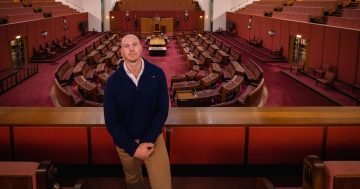
The cost of housing is so high if you are a first home buyer that whether you are aware of what the Government is doing or not, other options are not available.
Strata Community Association ACT president Chris Miller argues that the Territory government’s decision not to overhaul its rating system despite bipartisan calls for change effectively means that apartment owners are punished for helping to drive economic growth.
The ACT Government rates revenue grab is aimed at soft targets: first-home buyers who can just scrape into the property market with their first apartment, and downsizers, who are typically older Canberrans. These will be the worst hit.
Investors are more insulated because they are at least earning a return and can take advantage of negative gearing, although the new calculation method will undoubtedly generate upward pressure on rents, as investors seek to recover the tax burden from their tenants. The downsizers and the first home buyers will be left with no choice but to buy these properties because they don’t have any viable alternative.
Readers may recall that the formula for calculating rates for units in Canberra changed in 2017, when the ACT departed from a system where the land’s unimproved value was divided by the number of apartments on the site.
Instead, rates are now calculated by dividing the entire land value by the number of units, pushing most units into the top rating factor. Despite calls for a review and widespread anger, people are still being punished by this decision. Vacancy rates are at a historic low and population growth is stable, so people will still buy apartments not by choice, but because it is their only option.
The fact remains that people need places to live. If you are a first home buyer, an apartment remains the most cost effective (and likely the only practical) option of home ownership, despite the increased burden of an unfair rates system for that asset class. It follows that these people will invariably still buy apartments. Although they are motivated by different needs, a similar argument exists for downsizers, who will almost certainly continue to buy apartments. Those intending to live in their property will really carry the burden of this unfair grab for revenue. It’s not going to change their buying decision, but they will suffer for it.
Ironically, many of those whose budgets will suffer the most are traditionally Labor supporters. Labor is making a calculated approach that this cohort in their supporter base is small enough that the Government can hurt them financially, and get away with it with only a minimal dent in the polls. On the surface of it, the problem is quite esoteric and has been difficult to articulate in a manner that grabs the attention of the electorate, even for those who are implicated. This is low hanging fruit for the government, and they know it.
Assuming many of these buyers are going to make these decisions regardless, they are going to grit their teeth and get into the property anyway. They will need to consider other cost-saving measures that they can apply to their household budgets. I fear that critical maintenance and services to buildings are likely going to be the easiest things for these people to slash.
If you are coming into a building as a first home buyer or a downsizer and you have to make a decision about funding the body corporate sufficiently to pay for painting the building, replacing the carpet, replacing the cladding if it has fire issues and fixing things properly, then adequately funding the budget is expensive.
The first thing on the chopping block will be the contributions to the owners’ corporation. It is fair to say that the owners in a strata-titled building are made up in large parts by first-home buyers and downsizers who have been slugged by this extra tax and will be reluctant, or unable, to fund essential work in their building.
Firstly, that has ramifications for how the building presents and holds its value. Secondly, there are potential safety implications. Thirdly, it’s a dampener on economic activity. When you spend $500,000 or $1 million repainting an apartment building like Sky Plaza, that money goes into the hands of a painting company, who in turn will hire sub-contractors and employees, and they will purchase tools and other supplies from local businesses. This activity flows through to the Canberra economy. Instead, the government seems intent on bypassing this healthy activity in order to bank the cheques directly themselves. If you are an owner of a strata-titled property and you are not angry, you should be.
The ACT Government must reassess the formula that they have put in place. Thousands of people have petitioned against that formula, including a government-appointed committee who realised that the rates structure was plain wrong.
The only option to fix this injustice is for the ACT Government to re-visit the issue and re-assesses it. As it stands, it is manifestly unfair.
Chris Miller is the ACT President of Strata Community Association.
All views expressed in the article are the author’s own.





















